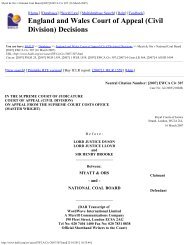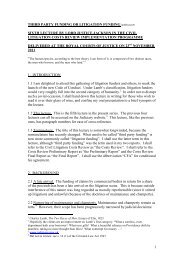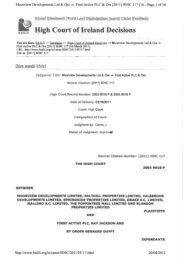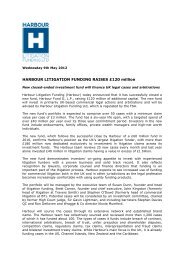[2013] SGHC 135 - Singapore Law Watch
[2013] SGHC 135 - Singapore Law Watch
[2013] SGHC 135 - Singapore Law Watch
You also want an ePaper? Increase the reach of your titles
YUMPU automatically turns print PDFs into web optimized ePapers that Google loves.
<strong>Law</strong> Society of <strong>Singapore</strong> v Kurubalan s/o Manickam Rengaraju [<strong>2013</strong>] <strong>SGHC</strong> <strong>135</strong><br />
where expressly permitted by the Courts and Legal Services Act 1990. Over<br />
time, the situation has evolved. Initially, only agreements under which the<br />
lawyer would receive his normal or an enhanced fee if he won and nothing or<br />
less than the usual fee if he lost were permitted. In these instances, any<br />
enhancement had to be expressed as a percentage of the normal fee that would<br />
have been charged had there been no such agreement. These agreements were<br />
known as conditional fee agreements and the uplift was called a success fee.<br />
As a result of subsequent changes, contingency fee agreements also known as<br />
“damages-based agreements” allowing the lawyer to receive a percentage of<br />
the claim if successful were permitted. Under these arrangements, the<br />
permitted percentage of the recovery which the lawyer may receive is capped<br />
depending on the type of claim: 50% in commercial claims, 35% in<br />
employment claims and 25% in personal injury claims. In such cases, the<br />
lawyer virtually becomes a joint venture partner of the client in the<br />
prosecution of the claim.<br />
63 In Australia, the states of Victoria, South Australia, New South Wales<br />
and Queensland have all decriminalised champerty. Conditional fee<br />
agreements have since been permitted in some states: see for example ss 323<br />
and 324 of Queensland’s Legal Profession Act 2007. However, outright<br />
contingency fees or damages-based agreements remain largely prohibited in<br />
the Australian states: see s 325 of Queensland’s Legal Profession Act 2007,<br />
s 285 of the Australian Capital Territory’s Legal Profession Act 2006 and<br />
s 325 of New South Wales’ Legal Profession Act 2004.<br />
64 As we have already observed, our rules have not changed in the same<br />
way. But what is the position where an Advocate and Solicitor of <strong>Singapore</strong> is<br />
engaged in his professional capacity and provides legal services pertaining to a<br />
claim in a jurisdiction which takes a different view to our own on this issue?<br />
34


![[2013] SGHC 135 - Singapore Law Watch](https://img.yumpu.com/37488807/34/500x640/2013-sghc-135-singapore-law-watch.jpg)
![Neutral Citation Number: [2010] EWHC 941 (QB) - Harbour ...](https://img.yumpu.com/47188668/1/190x245/neutral-citation-number-2010-ewhc-941-qb-harbour-.jpg?quality=85)
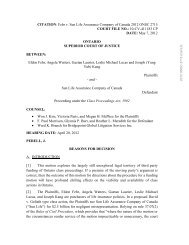
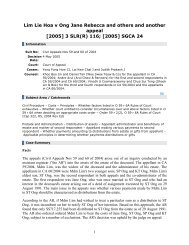
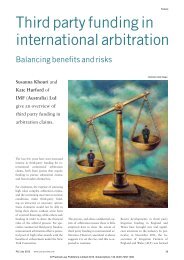
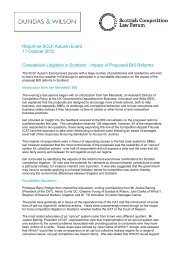
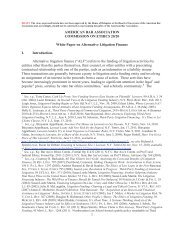

![Hall v Poolman [2009] - Harbour Litigation Funding](https://img.yumpu.com/37488843/1/190x245/hall-v-poolman-2009-harbour-litigation-funding.jpg?quality=85)
